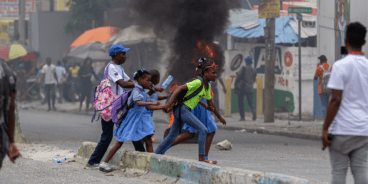Atrocity Alert No. 59: Syria and Yemen
Atrocity Alert is a weekly publication by the Global Centre for the Responsibility to Protect highlighting situations where populations are at risk of, or are enduring, mass atrocity crimes.
Syria
On 6 June the Syrian Democratic Forces (SDF), an alliance of armed opposition groups operating with air support from a United States-led coalition, launched a military offensive to liberate Raqqa from the control of the so-called Islamic State of Iraq and the Levant (ISIL). Raqqa has served as the capital of ISIL for over three years and has been the scene of systematic human rights abuses committed against the civilian population.
On 14 June Paolo Pinheiro, Chairman of the Independent Commission of Inquiry for Syria, told the UN Human Rights Council that the intensification of air strikes in Raqqa has resulted in “staggering loss of civilian life.” The UN estimates that that over 95,000 people have already fled the city, while over 100,000 remain trapped, including an estimated 40,000 children.
UN High Commissioner for Human Rights Zeid Ra’ad Al-Hussein has urged all forces fighting ISIL in Syria to take greater care to distinguish between legitimate military targets and civilians. According to the UN, during the offensive both hospitals and schools have come under attack, while civilians attempting to flee have been targeted by ISIL.
On 8 and 9 June eyewitnesses reported that United States-led coalition forces have used multipurpose white phosphorus munitions in Raqqa. White phosphorus can be used as an incendiary weapon that burns structures and people, causing horrific injuries. The air-delivery of white phosphorus and other incendiary weapons in civilian populated areas is prohibited under International Humanitarian Law (IHL). Last week’s Atrocity Alert reported on the use of white phosphorus in Mosul, an allegation that has subsequently been confirmed by Brig. Gen. Hugh McAslan of the US-led coalition. The coalition claims white phosphorus is being used in both Mosul and Raqqa to create a screen for fleeing civilians, although even the limited use of such a deadly and dangerous incendiary weapon in populated areas poses a direct threat to those same civilians that the US-led coalition intends to protect.
As the SDF continues to advance into Raqqa, all parties to the conflict must uphold their obligations under IHL. All suspected violations should be immediately and independently investigated and perpetrators held accountable, regardless of their position or affiliation.
Yemen
Fighting in Yemen continues to escalate, most notably within the city of Taizz. The humanitarian crisis in Yemen is now the largest in the world, with more than 18 million people in need of assistance and 7 million at risk of famine. A cholera outbreak, which began in April, has spread at an alarming speed, with over 124,000 suspected cases and 800 deaths recorded as of 13 June. According to the UN Children’s Fund, almost half of these cases are children.
Yemen’s humanitarian catastrophe is a direct result of ongoing armed conflict and the perpetration of mass atrocity crimes. The World Health Organization has reported that nearly 300 hospitals and clinics have been damaged or destroyed by fighting – many by airstrikes and shelling – and less than 45 percent of medical facilities in Yemen are still fully functioning.
Despite the magnitude of the crisis, the UN Security Council (UNSC) has failed to adequately respond to the conflict in Yemen. The UNSC has not issued a statement on Yemen in over a year, and has not passed a substantive resolution since April 2015. The UNSC should take immediate action to ensure the effective delivery of humanitarian assistance to civilians, including obligating parties to the conflict to facilitate the enhanced delivery of aid via Hodeidah port. The UNSC should also strengthen support for the unhindered implementation of the UN Verification and Inspection Mechanism’s mandate in Yemen and demand the re-opening of Sana’a airport for the delivery of humanitarian supplies and provision of medical treatment.
The crisis in Yemen cannot be solved with aid alone. The UNSC and regional powers must take meaningful steps to achieve a sustained ceasefire and a return to peace negotiations. The UNSC’s inaction only ensures that the misery of the Yemeni people will continue.
Read Next
Related Publications

Atrocity Alert No. 436: Haiti, Myanmar (Burma) and Syria

Atrocity Alert No. 434: Sudan, Ethiopia and the UN Human Rights Council
